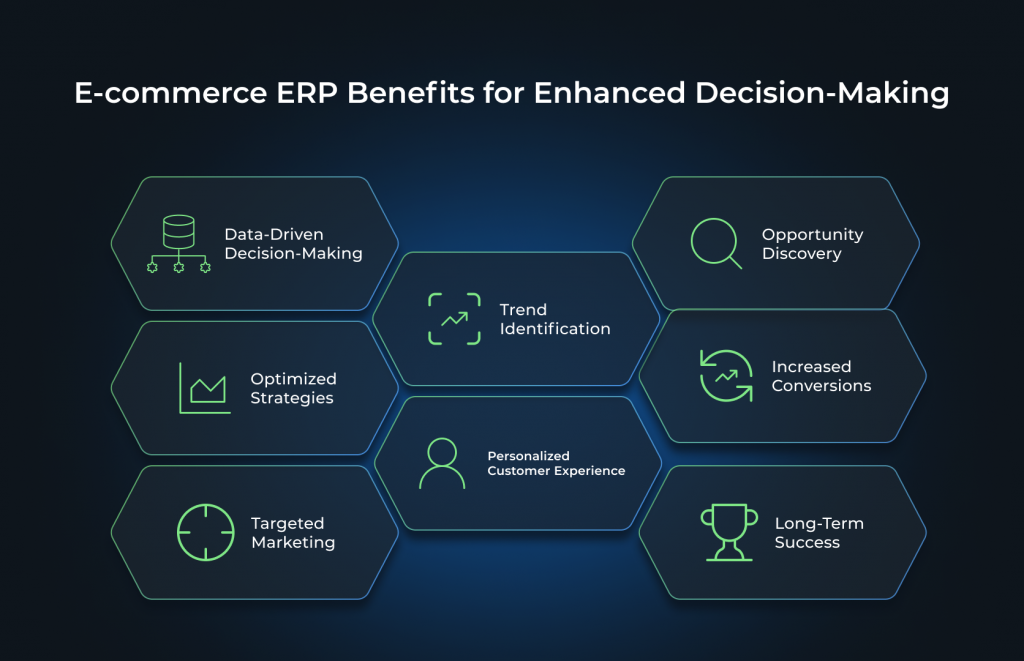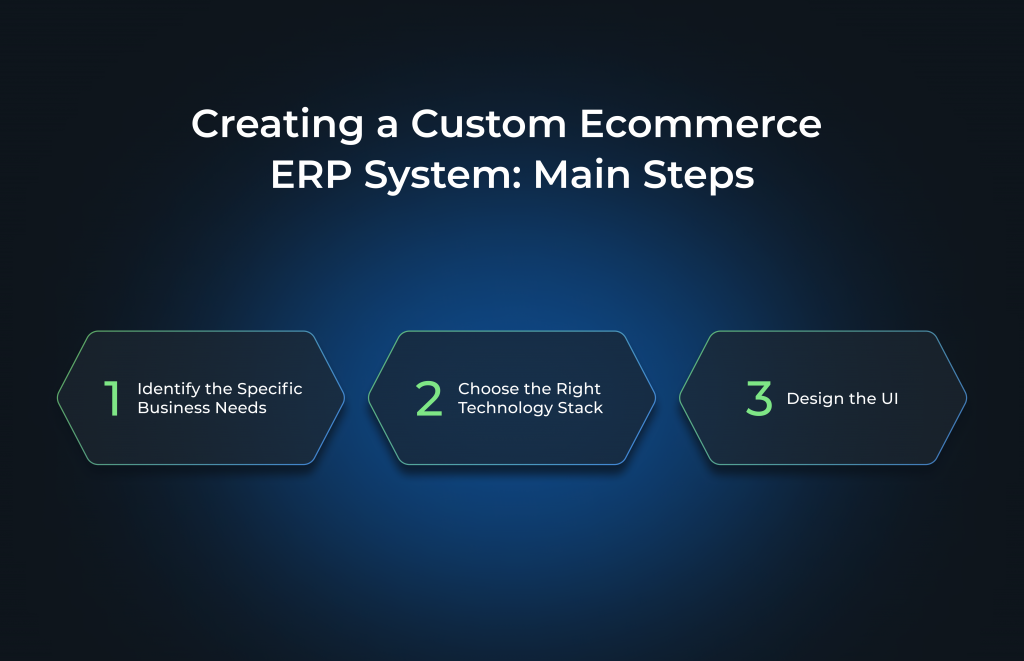We at WeSoftYou understand the importance of a data-driven decision-making ERP for e-commerce. In today’s digital age, it is crucial for businesses to have a comprehensive understanding of their e-commerce operations in order to optimize performance and drive growth. This article will guide you through the process of building a custom e-commerce ERP solution, specifically focusing on integrating it with an Enterprise Resource Planning (ERP) system.
The Importance of Custom ERP Systems
Custom ERP for e-commerce provide businesses with valuable insights into their online operations. These insights empower decision-makers to make data-driven choices that have a direct impact on their bottom line. Whether it’s monitoring sales performance, tracking customer behavior, or analyzing marketing campaigns, having an e-commerce ERP can help businesses gain a competitive edge.
When it comes to e-commerce, the online landscape is constantly evolving. With new trends emerging and customer preferences shifting, it’s crucial for businesses to stay ahead of the curve. This is where custom e-commerce ERP come into play. By harnessing the power of data, businesses can uncover hidden patterns and make informed decisions that drive success.
One of the key benefits of custom e-commerce ERP system is the ability to monitor sales performance. By tracking key metrics such as revenue, conversion rates, and average order value, businesses can identify areas of improvement and optimize their strategies accordingly. For example, if a certain product category is underperforming, businesses can take proactive measures to boost sales, such as running targeted marketing campaigns or offering special promotions.
What Is ERP in E-commerce?
An ERP system serves as the backbone of a company’s operations. It consolidates data from various departments and provides a centralized source of information. By integrating an ERP for e-commerce, businesses can leverage the power of both systems to gain a holistic view of their e-commerce operations. This integration enables real-time data synchronization, allowing decision-makers to make informed choices based on accurate and up-to-date information.
With the integration of an e-commerce ERP system, businesses can streamline their operations and improve overall efficiency. For example, by analyzing data from the sales department, businesses can identify patterns in customer behavior and adjust their inventory management accordingly. This can help prevent stockouts or overstocking, leading to cost savings and improved customer satisfaction.
Furthermore, the integration of an ERP system for e-commerce enables businesses to track the effectiveness of their marketing campaigns. By analyzing data on customer acquisition, conversion rates, and customer lifetime value, businesses can identify which marketing channels are driving the most value and allocate their resources accordingly. This data-driven approach to marketing can lead to higher ROI and more targeted campaigns.
Benefits of E-commerce ERP for Better Decision-Making

Data-driven decision-making is the cornerstone of successful e-commerce businesses. It allows decision-makers to move away from gut instincts and make choices based on objective insights. By analyzing data from various sources, businesses can identify trends, uncover opportunities, and optimize their strategies. These insights can lead to improved customer experiences, increased conversions, and overall business growth.
One of the key benefits of data-driven decision-making is the ability to personalize the customer experience. By analyzing customer data, businesses can understand their preferences, browsing behavior, and purchase history. This enables businesses to tailor their offerings and marketing messages to individual customers, increasing the likelihood of conversion and fostering customer loyalty.
In addition, data-driven decision-making can help businesses identify untapped market segments and expand their customer base. By analyzing demographic data, businesses can identify potential target markets and develop targeted marketing campaigns to reach these audiences. This can result in increased brand awareness, customer acquisition, and revenue growth.
Overall, custom e-commerce ERP play a crucial role in helping businesses thrive in the competitive online landscape. By harnessing the power of data, businesses can make informed decisions, optimize their operations, and drive growth. Whether it’s monitoring sales performance, tracking customer behavior, or analyzing marketing campaigns, investing in an e-commerce ERP solution is essential for long-term success in e-commerce.
Key Features of an Effective ERP Software
When building a custom e-commerce ERP, it is important to consider the key features that will make it effective and user-friendly.
An effective ERP for e-commerce businesses goes beyond just tracking basic metrics. It provides a comprehensive analysis of your online business, giving you valuable insights into various aspects of your operations. Let’s explore some additional features that can enhance the effectiveness of your e-commerce ERP system.
Essential Metrics to Track
From our experience, we recommend tracking metrics such as sales performance, customer acquisition and retention, conversion rates, average order value, and customer lifetime value. These metrics provide insights into various aspects of your e-commerce business and help you identify areas for improvement.
However, an effective e-commerce ERP system goes beyond these essential metrics. It delves deeper into the data to provide you with a holistic view of your business. It can track metrics such as customer segmentation, product performance, marketing campaign effectiveness, and inventory management. By analyzing these additional metrics, you can gain a deeper understanding of your customers, products, and marketing strategies.
Real-Time Data Analysis and Reporting
A good e-commerce ERP solution should provide real-time data analysis and reporting capabilities. This allows decision-makers to access up-to-date information and make informed choices in a timely manner. Real-time reporting also enables businesses to respond quickly to market changes and capitalize on opportunities.
However, real-time data analysis is just the tip of the iceberg. An effective ERP solution should also offer advanced data visualization capabilities. It should present the data in an intuitive and visually appealing manner, making it easier for users to understand and interpret the information. Interactive dashboards, charts, and graphs can help you identify trends, patterns, and outliers, enabling you to make data-driven decisions with confidence.
Integration with Third-Party Tools
Another important feature of an effective e-commerce ERP soultion is its ability to integrate with third-party tools. Integration with tools such as customer relationship management (CRM) systems, email marketing platforms, and inventory management software allows for seamless data flow between different systems. This integration eliminates manual data entry and ensures that you have a complete and accurate view of your business.
Furthermore, integration with external data sources, such as social media platforms and marketplaces, can provide valuable insights into customer behavior and market trends. By combining internal and external data, you can gain a comprehensive understanding of your target audience and make data-driven decisions to drive growth.
Customization and Scalability
An effective ERP for e-commerce business should be customizable and scalable to meet the unique needs of your business. It should allow you to define custom metrics, reports, and dashboards based on your specific requirements. This flexibility ensures that you can track and analyze the metrics that matter most to your business.
Scalability is also crucial, especially if you have plans for future growth. Your ERP software for e-commerce should be able to handle increasing data volumes and accommodate additional users without compromising performance. It should also support integration with new technologies and data sources as your business evolves.
In conclusion, an effective e-commerce ERP solution goes beyond basic metrics and provides a comprehensive analysis of your online business. It offers real-time data analysis and reporting, integration with third-party tools, customization, and scalability. By investing in a robust e-commerce ERP solution, you can gain valuable insights, make data-driven decisions, and drive growth in your e-commerce business.
Steps to Building a Custom ERP System for E-commerce

Building a custom ERP for e-commerce requires careful planning and execution. Here are the key steps involved:
Identifying Your Specific Business Needs
Before embarking on building an ERP system, it is crucial to identify your specific business needs. Every e-commerce business is unique, and understanding your requirements will help you build a tool that addresses your specific challenges and goals.
When identifying your business needs, consider factors such as the type of products or services you offer, your target audience, and your overall business objectives. For example, if you run a fashion e-commerce store, you may want to focus on metrics such as conversion rates, average order value, and customer retention. On the other hand, if you operate a subscription-based service, you may be more interested in metrics related to churn rate, customer lifetime value, and acquisition costs.
By taking the time to clearly define your business needs, you can ensure that your custom e-commerce ERP provides you with the insights and data that are most relevant to your success.
Choosing the Right Technology Stack
Choosing the right technology stack is essential for building an effective e-commerce ERP. From our experience, we recommend using a combination of programming languages, databases, and frameworks that are suitable for handling large volumes of data and providing real-time analysis.
When selecting your technology stack, consider factors such as scalability, performance, and ease of integration. For example, if you expect your e-commerce business to grow rapidly and generate a significant amount of data, you may want to consider using a distributed database system that can handle the load. Additionally, choosing a programming language and framework that have robust data processing capabilities can help you efficiently analyze and visualize your data.
It’s also important to consider the long-term maintenance and support of your e-commerce ERP. Ensure that the technologies you choose have an active community and reliable documentation, as this will make it easier to troubleshoot issues and keep your tool up to date.
Designing the User Interface
The user interface of your e-commerce ERP solution plays a significant role in its usability and adoption. It should be intuitive, visually appealing, and provide users with easy access to the metrics and insights they need. From our experience, we recommend conducting user testing and gathering feedback to ensure that the user interface meets the needs of your decision-makers.
When designing the user interface, consider the different user roles and their specific needs. For example, your marketing team may require a dashboard that highlights key marketing metrics, while your finance team may need access to financial data and revenue projections. By understanding the requirements of each user group, you can create a user interface that caters to their specific needs.
Additionally, consider the visual representation of data in your ERP software for e-commerce. Utilize charts, graphs, and other visual elements to make it easier for users to interpret and analyze the data. Interactive features, such as drill-down capabilities and customizable dashboards, can also enhance the user experience and empower users to explore the data in more detail.
Remember to iterate and gather feedback throughout the design process. Conduct user testing sessions and gather input from your stakeholders to ensure that the user interface is intuitive, user-friendly, and aligns with your overall business goals.
Maintaining and Upgrading Your E-commerce ERP Software
Building a custom e-commerce ERP system is just the beginning. Ongoing maintenance and upgrades are necessary to ensure its effectiveness and relevance.
When it comes to maintaining your e-commerce ERP soultion, regular system checks and updates play a crucial role. These checks are essential for keeping your tool running smoothly and efficiently. By monitoring the system performance, you can identify any potential issues or bottlenecks that might be hindering the tool’s performance. Additionally, conducting security audits is vital to ensure that your e-commerce ERP is protected against any potential threats or vulnerabilities.
Another important aspect of maintaining your ERP for e-commerce is applying software patches and updates. As technology advances and new features become available, it is crucial to keep your tool up to date. Software patches and updates not only address any bugs or glitches but also introduce new functionalities and improvements to enhance the overall user experience.
Adapting to Changing Business Needs
While building a custom ERP for e-commerce, you must consider the ever-changing nature of business needs. As your business evolves over time, so will your analytics requirements. It is important to regularly revisit and reassess your analytics needs to ensure that your ERP for e-commerce continues to provide valuable insights.
Gathering feedback from users is an effective way to understand their changing needs and expectations. By actively seeking input from those who use the e-commerce ERP system on a regular basis, you can gain valuable insights into areas that may require improvement or additional features. This feedback can help you make informed decisions about the necessary adjustments to meet the changing needs of your business.
Moreover, staying updated with the latest industry trends and best practices is essential for adapting your e-commerce ERP solution. By keeping an eye on emerging technologies and advancements in the field, you can identify opportunities to enhance your tool’s capabilities and stay ahead of the competition.
In conclusion, maintaining and upgrading your ERP for e-commerce business is an ongoing process that requires regular system checks, software updates, and adaptation to changing business needs. By investing time and effort into these areas, you can ensure that your tool remains effective, relevant, and capable of providing valuable insights to drive your business forward.
Measuring the Success of Your ERP System
The success of your best ERP for e-commerce business can be measured in various ways. It is important to regularly evaluate its impact on your decision-making process.
Evaluating Data Accuracy and Relevance
From our experience, we recommend conducting regular audits to assess the accuracy and relevance of the data provided by your ERP for e-commerce. This will ensure that you are making decisions based on reliable information.
Assessing Impact on Decision-Making Process
An effective ERP for e-commerce companies should have a positive impact on your decision-making process. We recommend gathering feedback from decision-makers and evaluating how the tool has influenced their choices and outcomes. This feedback can help identify areas for improvement and fine-tune your ERP software for e-commerce.
In conclusion, building a custom e-commerce ERP solution integrated with an ERP system can provide businesses with valuable insights for data-driven decision-making. From our experience at WeSoftYou, we understand the importance of having a reliable e-commerce ERP solution that meets your specific needs. By following the steps outlined in this article, you can build a tool that empowers your decision-makers and drives your e-commerce business forward.
FAQ
ERP, or Enterprise Resource Planning, in e-commerce refers to a software system that integrates and manages various business processes and operations within an e-commerce company. It streamlines tasks such as inventory management, order processing, customer data, accounting, and more, providing a centralized platform for efficient and data-driven operations.
E-commerce ERP integration establishes automated communication between e-commerce and ERP systems. It enables real-time data sharing, such as customer information and inventory levels. This synchronization enhances order processing, reduces errors, and provides a holistic view of business operations, ultimately improving efficiency and customer service.
The cost of building a custom ERP for e-commerce can vary significantly based on the specific requirements and features needed. On average, custom ERP development can cost anywhere from $100,000 to $500,000 or more, depending on complexity and functionality. It’s essential to consult with an experienced software development team to get an accurate cost estimate tailored to your business needs.
If you’re looking to build a custom ERP for e-commerce or have any questions, feel free to reach out to us at WeSoftYou for a free consultation or project estimation. Our expertise in software development and track record of successful projects can help you achieve your goals and make data-driven decisions for your business. Contact us today!






















